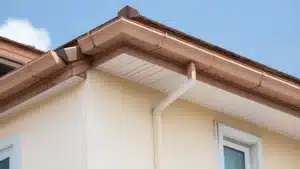
Foam gutter guards are one of the most budget-friendly and easiest-to-install gutter protection solutions available. Designed to fit directly inside your gutters, these guards use a porous foam material to allow water to flow through while blocking leaves and debris. Because of their affordability and DIY-friendly installation, they are a popular choice for homeowners looking for a quick fix to gutter clogs.
However, foam gutter guards come with trade-offs. While they work well in areas with minimal debris, they may not be the best long-term solution for every home. In this guide, we’ll explore the pros and cons of foam gutter guards to help you determine if they are the right choice for your home.
Pros of Foam Gutter Guards
Foam gutter guards offer several advantages, particularly for homeowners looking for an easy-to-install, cost-effective solution.
Easy DIY Installation
Foam gutter guards require no tools or professional installation.
Simply cut the foam to size and place it inside the gutter. This makes it perfect for DIY enthusiasts.
Affordable Compared to Other Gutter Guard Types
One of the cheapest gutter guard options, making them accessible for homeowners on a budget.
Costs range from $2 to $4 per linear foot, significantly lower than metal or micro-mesh guards.
Works Well in Areas with Minimal Debris
Ideal for homes without overhanging trees or heavy foliage.
Helps block larger debris like leaves and twigs, preventing gutter clogs.
Cons of Foam Gutter Guards
While foam gutter guards have their benefits, they also come with notable downsides that homeowners should consider before purchasing.
Can Trap Moisture, Leading to Mold/Mildew Buildup
Foam is highly absorbent, which means it can retain water and promote mold growth.
In humid or rainy climates, this trapped moisture can cause premature deterioration.
Short Lifespan (2-5 Years)
Foam breaks down over time due to UV exposure and moisture absorption.
Compared to other types of gutter guards, which can last 10-20 years, foam guards require frequent replacement.
Not Ideal for Heavy Rainfall Areas
Foam gutter guards can become oversaturated in areas with excessive rain, slowing water drainage.
During heavy storms, they may clog more easily than other guard types, leading to overflow.
Are Foam Gutter Guards Worth It?
Foam gutter guards may be a good temporary solution for homeowners looking for a low-cost and DIY-friendly option. They work well in dry climates and homes with minimal tree coverage. However, if you live in an area with frequent rain, pine needles, or heavy debris buildup, a more durable gutter guard (such as mesh or micro-mesh) may be a better investment.
Alternative Options for Longer-Lasting Protection
Micro-mesh gutter guards: Best for blocking small debris and require minimal maintenance.
Reverse curve gutter guards: Ideal for heavy rain areas as they direct water into the gutters while debris falls away.
Screen gutter guards: A budget-friendly alternative with a longer lifespan than foam guards.
FAQs About Foam Gutter Guards
How long do foam gutter guards last?
Foam gutter guards typically last 2–5 years, depending on exposure to sunlight, moisture, and debris accumulation. They need to be replaced more frequently than other types of gutter guards.
Do foam gutter guards prevent clogs?
Foam gutter guards help prevent large debris clogs but may allow small particles, like pine needles and dirt, to accumulate over time, requiring occasional maintenance.
Can foam gutter guards be installed on any gutter type?
Yes, foam gutter guards are designed to fit most standard gutters, but they may not perform well in oversized or box-style gutters used in high-capacity drainage systems.
Conclusion: Should You Invest in Foam Gutter Guards?
Foam gutter guards are an affordable, easy-to-install option for homeowners who need a short-term solution to reduce gutter clogs. However, their short lifespan, moisture retention issues, and performance limitations make them less ideal for long-term use, especially in areas with heavy rain or extensive debris.
If you’re looking for a more durable alternative, consider micro-mesh or reverse curve gutter guards, which offer better long-term performance and protection.








